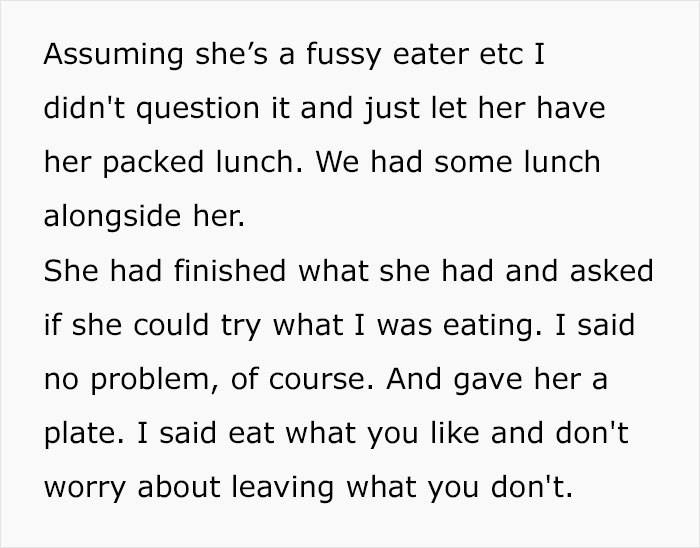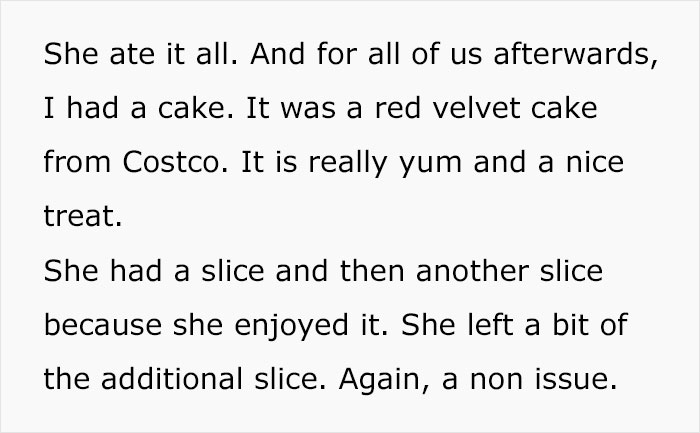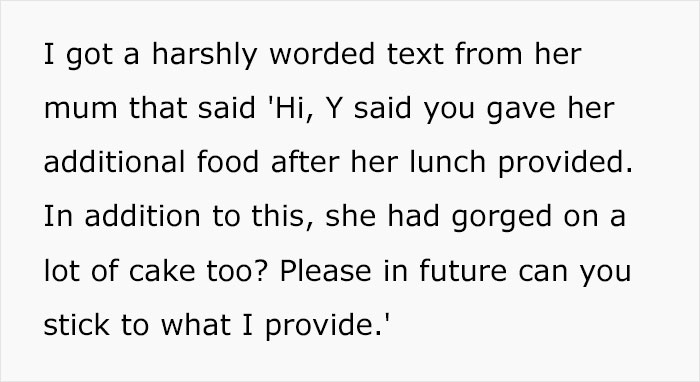Looking after someone’s child entails making sure that they’re safe, and—hopefully—happy. And to keep them that way, carers usually use their best judgment, unless given certain instructions from the parent.
The only thing this woman was given was a packed lunch when her friend dropped off her 7-year-old daughter. But when the child was seemingly still hungry after finishing what her mom had packed, the woman felt it was okay for her to have some more. It turned out, it wasn’t.
Looking after someone else’s child is a great responsibility

Image credits: cottonbro studio / Pexels (not the actual photo)
This woman thought it was okay for her friend’s daughter to eat as much as she wanted, but that’s not how her mother felt




Image credits: Karolina Kaboompics / Pexels (not the actual photo)



Image credits: jerkorperk

Image credits: fauxels / Pexels (not the actual photo)
It might be good to discuss certain topics, such as food, before leaving your child in someone else’s care
Needless to say, looking after someone’s child is a huge responsibility; and still, many friends, relatives, or even neighbors agree to do it if the parent needs help. As a matter of fact, such a form of help—known as FFN care, the acronym standing for friends, family, and neighbors—is reportedly the most prevalent form of non-parental childcare and a first choice and preference for many families out there.
But whether it’s a close friend, an aunt, or even a sibling, who arguably grew up with the same upbringing, how can you be sure they will follow the same philosophies or rules, if any, as you do as a parent? And should you expect them to?
Take food, for instance; the thing that caused the issue between the OP and her friend. It’s no secret that eating habits, as well as the type of food families consume, differ with each household. If you as a parent don’t allow your kids to have McDonald’s three times a day or stuff themselves with sugar before bed, how can you be sure their grandmother won’t cave in to the pressure of their puppy eyes?
In such situations, BabyCenter suggests having a conversation with the carer and discussing how to handle some of the main issues or scenarios that can arise while looking after the child. Such things to discuss before leaving your offspring in the care of others include expected ways of discipline, the child’s interactions with other people, sleep, crying, playtime, and, of course, food.

Image credits: cottonbro studio / Pexels (not the actual photo)
It’s important to not only provide kids with enough food, but also to make sure it’s healthy
Needless to say, it’s important to make sure that not only does a kid have enough food, but that it’s healthy as well, as proper nutrition is crucial for a developing body and mind. According to a public health specialist, Dr. Carina Ferreira-Borges, it’s also crucial for better health in the future. “A healthy diet is especially important for primary school-aged children. Establishing good nutrition habits early in life can substantially decrease risks of child obesity and overweight, and can lead to better health for years to come,” she told the World Health Organization.
Another expert, Dr. Kremlin Wickramasinghe, detailed that “A healthy diet includes high consumption of fresh fruits and vegetables, daily breakfast consumption and discouraging routine consumption of nutrient-poor foods that are high in sugars, saturated fats, trans fats and salt.”
Chances are, the OP’s friend didn’t want her child eating something as sugar-infused as cake, which became part of the reason she was upset with her friend. There might have also been a reason she didn’t want her daughter eating anything else that wasn’t pre-packed for her. But the mother’s reaction split the netizens into camps, as while some believed there might have been an explanation for it, others said the 7-year-old’s mother was plain rude.
People in the comments didn’t think the woman did anything wrong











Some, though, saw why the child’s mother might have been upset





A fellow netizen shared a similar story








